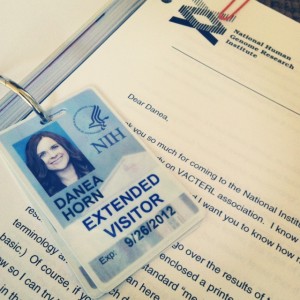Participating in a clinical trial can be intimidating. There are certainly lots of things to consider based on what it being tested. That said, you can also participate in making history.
 During September of 2011, I traveled to the National Institute of Health (NIH) in Bethesda, Maryland to participate in a VACTERL study. A researcher at NIH was looking to see if there is a genetic cause behind the VACTERL manifestations.
During September of 2011, I traveled to the National Institute of Health (NIH) in Bethesda, Maryland to participate in a VACTERL study. A researcher at NIH was looking to see if there is a genetic cause behind the VACTERL manifestations.
Each morning I visited the hospital for a barrage of tests (ultra sounds, EKG, x-rays, etc…) and other meetings (genetic counseling, physical exam, etc…). Once it was determined that I had VACTERL, my DNA was extracted in a blood sample to be compared with other study participants’ samples to look for commonalities.
If you have a diagnosis, it is worth searching through www.ClinicalTrials.gov to see if there are any research studies going on related to your illness. This website will give you all of the information you and your doctor need to determine if it is something you want to explore further. You’ll read where the study is taking place, what phase of the study they are in, what hypothesis is being tests, who the research team is and other considerations. You can also find upcoming studies and completed studies here to find out the latest and greatest related to your condition.
Please look at both the risks and potential benefits of participating in a study before you decide to join in. While medical science needs study participants to move medical advances forward, this isn’t for everyone. Be sure to talk in depth with your current care providers and the researchers about potential complications and what to expect.
With that disclaimer aside, there are 10 amazing reasons to participate in a clinical trial:
- Medical care and medications related to the study are free.
- You may learn more about your body and illness than you would have otherwise.
- You get to meet and work with a team that is on the cutting edge of your diagnosis.
- You may receive positive health benefits from experimental drugs or treatments.
- Some studies pay for travel.
- You are helping to contribute to the future health of others.
- In some instances clinical trials extend lives.
- You may find a successful treatment for a condition where others had failed.
We are a collective society. Individuals need to step up to move things forward for everyone. Clinical trials are an important way for us to extend ourselves for hopefully the benefit of our condition and medicine as a whole.
